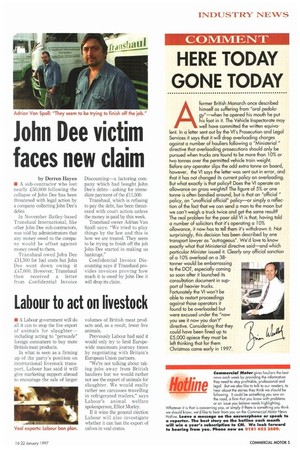HERE TODAY GONE TODAY
Page 7

If you've noticed an error in this article please click here to report it so we can fix it.
former British Monarch once described himself as suffering from "oral pedolo gy"—when he opened his mouth he put his foot in it. The Vehicle Inspectorate may
well have committed the written equivalent. In a letter sent out by the VI's Prosecution and Legal Services it says that it will drop overloading charges against a number of hauliers following a "Ministerial " directive that overloading prosecutions should only be pursued when trucks are found to be more than 10% or two tonnes over the permitted vehicle train weight. Before any operator slips the odd extra tonne on board, however, the VI says the letter was sent out in error, and that it has not changed its current policy on overloading. But what exactly is that policy? Does the VI operate an allowance on gross weights? The figure of 5% or one tonne is often bandied around, but is that an "official " policy, an "unofficial official" policy—or simply a reflection of the fact that we can send a mart to the moon but we can't weigh a truck twice and get the same result? The real problem for the poor old VI is that, having told a number of solicitors that it's operating a 10% allowance, it now has to tell them it's withdrawn it. Not surprisingly, this decision has been described by one transport lawyer as "outrageous". We'd love to know exactly what that Ministerial directive said—and which particular Minister issued it. Clearly any official sanction of a 10% overload on a 38tonner would be embarrassing to the DOT, especially coming so soon after it launched its consultation document in support of heavier trucks, Fortunately the VI won't be able to restart proceedings against those operators it found to be overloaded but were excused under the "now you see it now you don't" directive. Considering that they could have been fined up to £5,000 apiece they must be left thinking that for them Christmas came early in 1997.












































































































